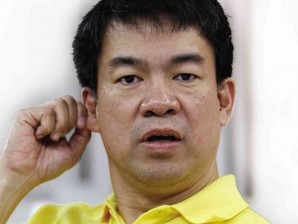MANILA, Philippines—Reelectionist Sen. Aquilino “Koko” Pimentel III on Thursday threatened to pursue disqualification cases against candidates that go beyond the Commission on Elections’ (Comelec) campaign airtime limits if the Supreme Court eventually decides to uphold the poll body’s regulation.
Pimentel, who lost four years of his first senatorial term due to electoral fraud, said the Supreme Court may have stopped the Comelec’s 120-minute cap on political ads per candidate but it has yet to decide on the merits of the case against the rule.
“If the Supreme Court eventually decides that the Comelec is right to limit television airtime to 120 total minutes, then I will be duty-bound to move for the disqualification of those who have exceeded the limit,” Pimentel said in a text message to the Inquirer.
Candidates with more funds for advertising are expected to take advantage of the Supreme Court’s status quo ante order against the Comelec’s airtime cap to come up with more television and radio spots in the homestretch of the campaign period.
Asked if his threat to push for the disqualification of candidates who will violate the airtime limits also goes for his fellow candidates of President Aquino, Pimentel said, “Syempre (Of course), all.”
Sen. Franklin Drilon, campaign manager of Team PNoy, expressed agreement with Pimentel’s views.
“Koko is saying, [candidates] be very careful. Perhaps, even he would be wary,” Drilon told reporters.
Sen. Francis Escudero, another reelectionist in the Team PNoy ticket, earlier said the Supreme Court needs to clarify what will happen to winning candidates who went beyond the limits set by the Comelec if the Supreme Court decided after the elections that the Comelec was well within its authority to set the airtime limits.
One of the petitioners against the airtime cap is also a reelectionist in the administration ticket.
Sen. Alan Peter Cayetano has lauded the Supreme Court’s ruling to stop the implementation of the Comelec limit on political advertisements, calling it “a victory for democracy and for voters in poor rural areas with limited or no access to national television.”
